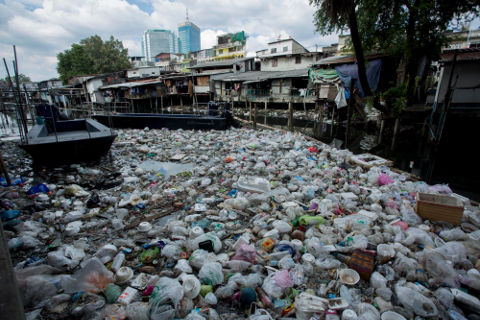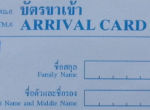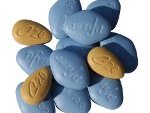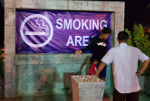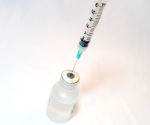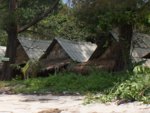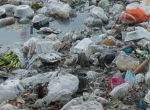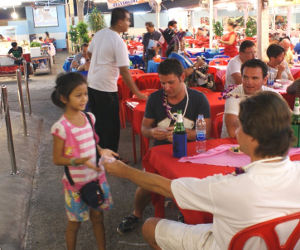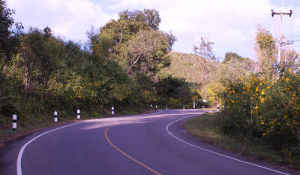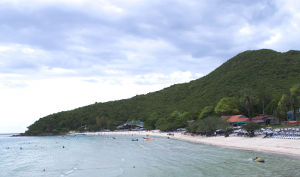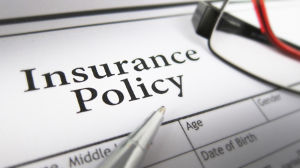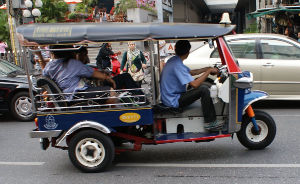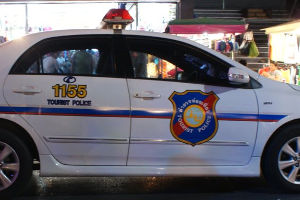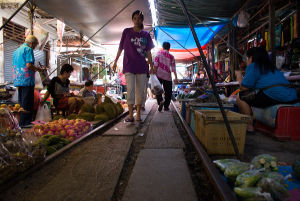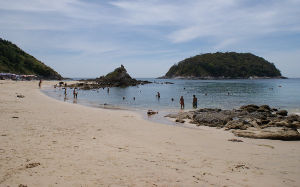Eco-friendly in Thailand
It is not easy to be eco-friendly in Thailand.
If you are eco-friendly and recycle at home, you will find that things work somewhat different in Thailand. In this article, you can read about how recycling works in Thailand and what you can do to help the environment on your holiday.
No Trash Cans
You will find that trash cans are rare to find in public places in Thailand. After your visit to the beach, you will have a hard time to find a place to leave your garbage and empty bottles.
I have often seen well-behaved tourists walking around with garbage in their hands looking – in vain – for a trash can. You will not see the locals walking around with garbage, looking for a trash can; typically, they will leave the garbage at the roadside or somewhere out of sight.
The photo below is taken by Chanklang Kanthong from Greenpeace and shows waste in Hua Lamphong Canal in Bangkok.
You may also see the locals throwing popsicle paper and the like on the ground outside a 7-Eleven, even though you actually will find trash cans there. Generally, the locals have an out of sight, out of mind attitude to garbage.
Lots of Plastic
The use of plastic is overwhelming. If you buy a bottle of water in a 7-Eleven, they will automatically put the bottle in a free plastic bag together with a plastic straw – which, of course, is also wrapped in plastic.
In some countries, you pay a deposit for bottles and cans so they can be recycled - not so in Thailand; thus, after drinking the water, the plastic bottle will end with the all the other waste.
Fortunately, there is a change in the attitude towards the use of plastic. The management in 7-Eleven tries to teach the staff to ask if you want a bag, instead of automatically giving you a bag when you purchase small items like a packet of cigarettes, a packet of gum, or a bottle of water. And most of the producers of bottled water have stopped sealing the bottles with a plastic seal on the cap.
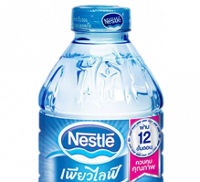
Now, it may not sound like removing the plastic seal will amount to much saving of plastic; however, the annual sales of bottles with sealing were previously 2.6 billion bottles annually; thus, they expect to save 520 tons of non-recyclable plastic a year. As a bonus, the customer does not have to struggle to get the plastic seal off.
In some supermarkets, they have introduced a plastic bag free day a month, which is but a nuisance to the customers. Some of them have talked about introducing payment for plastic bags which actually would make a difference; however, the fear of losing customers will probably mean that they will only start charging for plastic bags if they all do it at the same time.
So, for the time being, things are more or less as usual in the supermarkets; the cashier put your goods in plastic bags, and she will sooner give you too many bags than too few. You still get an odd look, if you bring your own used bag.
Even the authorities have begun to act to reduce the use of plastic; from 2020 they forbid seals on bottle caps, microplastic in cosmetics, and the use of oxo-degradable plastic, which does break down into smaller parts, but then can accumulate in nature in the same way as microplastic.
Furthermore, from 2022, they will ban styrofoam containers for food, disposable cups and cutlery made of plastic, plastic straws and thin disposable plastic bags of the type which are supplied free of charge in supermarkets and 7-Eleven.
However, unless the shops start charging for plastic bags, I fear that they will replace the thin plastic bags with thicker plastic bags and that those also will be used only once - resulting in even more plastic waste.
An estimate of the use of thin plastic bags in Thailand says that every person in Thailand uses eight bags a day.
In a peer-reviewed article in Science Magazine, researchers consider Thailand the world's sixth-largest plastic pollutant of the oceans. With its much larger population, China is the worst, India is number 12, and the USA is the worst western country at number 20 on the list.
Waste Management
It is not only in the public space that garbage cans are a rarity; small shops and houses rarely have access to garbage cans either. Instead, they put their waste in plastic bags that they place at the roadside in the evening. During the evening or early in the morning, garbage collectors will pick up the plastic bags. There is no official or central plan for sorting waste.
Nevertheless, extensive waste sorting does take place, although it is not as effective as in countries with advanced recycling plans. You will see scavengers picking up reusable garbage from wherever people have left it, and they are going through the garbage in the garbage bags as well before the garbage trucks arrive. Typically, you will see several scavengers going through the same garbage bags, hoping to find what the first ones have overlooked or didn't bother to take.
Choose a currency to see the prices below in another currency.
The current currency is baht; the exchange rate is 100 baht = 100 baht.
Choose another currency:
We save your choice in a cookie to remember it for other articles.
The scavengers sell the sorted waste at recycle stations, where they, typically, receive 4 baht (4 baht) for 1 kg of cardboard, 0.5 baht (0.5 baht) for a beer or soda can and 0.2 baht (0.2 baht) for a water bottle. They can also sell batteries and newspapers, but here, the sorting system shows its weakness, only the most desperate will try to find batteries from a garbage bag with kitchen waste.
It is not everywhere that scavengers will search the garbage for valuables. If no scavengers are going through the garbage, then the garbage collectors may go through the garbage to make an extra dime; otherwise, it may all ends up at a landfill. Or wherever else they choose to dump it, which reminds me of an example of the locals out of sight, out of mind attitude to garbage.
Back in 2011, Rob recorded the video below on Layan Beach in Phuket. A large wedding had taken place on the beach the night before, and instead of bringing the garbage to the nearest landfill or incinerator, they buried the garbage in the sand.
In short, recycling in Thailand has nothing to do with protecting the environment; it is only a way to make money. Sometimes the two things go hand in hand, but if there is no value in environmentally hazardous substances, they are not collected.
Typically, empty bottles are recycled thanks to the scavengers; however empty bottles do not always end up at a recycle station. In the Sisaket province, they found another use for empty bottles; they give the bottles to the local temple. The temple uses the bottles as decorations on their buildings; read more about the temple in the article Temple of a Million Bottles.
What you can do
If you want to be eco-friendly on your holiday in Thailand, say no to unnecessary plastic bags and other unnecessary disposable plastic items when you are shopping or buy food and drinks in a 7-Eleven or similar.
Bring one or two bags for waste when you go to the beach. Use one of the bags for recyclable waste, for instance, bottles and cans, and the other bag for non-recyclable waste.
If you are lucky, you may find a garbage can for your waste; there may even be more than one, in which case the yellow is for recyclable garbage.
If you do not find garbage cans, you may see big black bags with garbage at the roadside along your way; you can leave your waste there. Otherwise, take it back to your hotel; here, scavengers or the staff may take the recyclable waste to sell.




